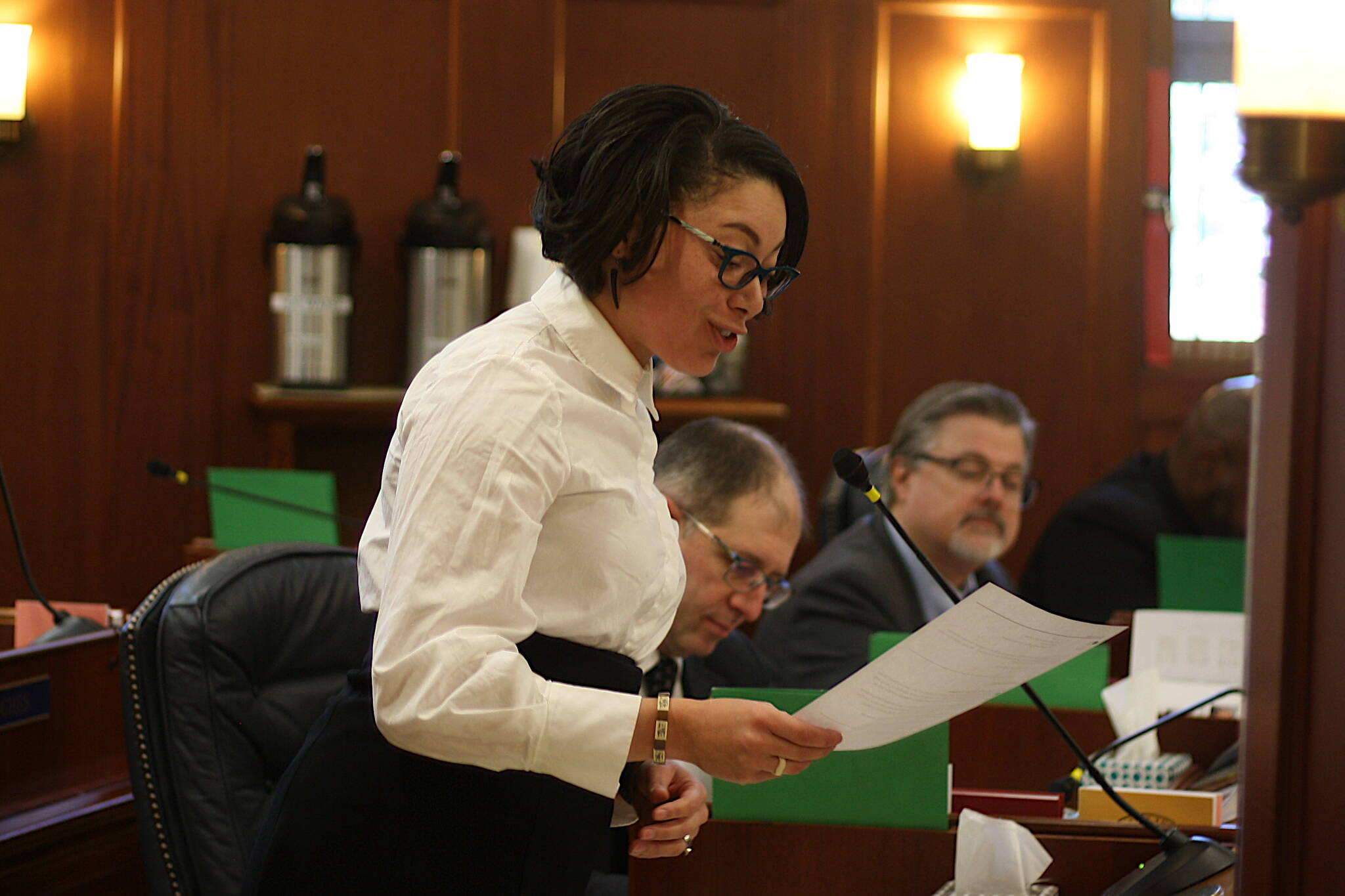This article has been updated to include additional comments from lawmakers.
A bill from Gov. Mike Dunleavy limiting sex and gender discussions in public schools will at the least get a public legislative hearing, although ultimately not much time may be spent on it if it appears to have little chance of passage, Senate President Gary Stevens said Wednesday.
The bill prohibits sex and gender discussions before the fourth grade, requires parental permission for such discussions for other grades (instead of the current so-called “opt-out” provision for sex education), requires written parental permission for a child to be addressed by a different name or pronoun, and requires students to use locker rooms and restrooms according to their biological sex.
The possibility Dunleavy’s bill — Senate Bill 96 and its companion House Bill 105 — would essentially be dead-on-arrival arose shortly after he announced it Tuesday, as state Sen. Löki Tobin, an Anchorage Democrat, said it wouldn’t get a hearing if referred to the Education Committee she chairs. But the bill was referred to the Judiciary and Finance committees during the Senate floor session Wednesday, and Stevens said in an interview afterward he wants public consideration of the bill.
“I think we owe the governor that respect, so the bill will be heard,” he said.
The committee referrals were due to possible legal issues in addition to the financial impacts, not an effort to avoid the Education Committee in the wake of Tobin’s comments, Stevens said. Among other factors, he said the Education Committee already has a full calendar of other bills including a revision of the per-student funding formula that is among the foremost issues this session — and Dunleavy’s bill may eventually get referred there as well.
Stevens, a Kodiak Republican, also said “I don’t want to waste a lot of time on a bill that has no chance of passage,” and at present it doesn’t appear there is enough support in the bipartisan majority of nine Democrats and eight Republicans to pass a floor vote.
Dunleavy, in a news conference unveiling the bill Tuesday, adamantly denied it’s a “don’t say gay” law such as the one that was enacted a year ago in Florida, variations of which have been introduced in more than 20 states. But Alaska legislators expressing opposition to Dunleavy’s bill said the primary intent is the same: singling out LGBTQ+-related material and students.
“We don’t need Florida’s politics in Alaska,” Minority Leader Calvin Schrage, an Anchorage independent, said Wednesday.
A far more elaborate and emotional denunciation of Dunleavy’s bill was made during Wednesday’s House floor session by Andrew Gray, an Anchorage Democrat, who said it hurts “gender non-conforming children like I once was.”
“To those kids I want to say you can be friends with whomever you want,” he said in a tearful voice. “You can plays sports or not. You can dress the way you want to dress. You can use the names you want to use. You can play with the toys you want to play with. This is America. You are free.
“You are no one’s shame. You are not your parents’ property. You are your own person. You are perfect the way you are.”
Numerous educators and their associations in Alaska also quickly expressed concerns. NEA-Alaska President Tom Klaameyer said in a prepared statement the association “believes parental involvement is critical for student learning and we welcome conversations that will help each child achieve academic success.
“However, this legislation seems to strip away local school districts’ ability to govern themselves and establish systems that facilitate robust parent-teacher engagement,” he said. “Every single Alaska student should feel safe, welcome, and supported in their public school regardless of their background.”
An examination of the legislative language of the Florida law and Dunleavy’s bill shows there are substantial differences. But many of the foundational elements are similar, including the opening titles that are “An Act relating to parental rights in a child’s education” (Alaska) compared to “An act relating to parental rights in education” (Florida).
Another key similarity restricting discussion of sexual orientation and gender identity before fourth grade, which proponents of the Florida law touted as one of the main provisions. A notable item in Dunleavy’s bill — also similar to Florida policy — is an exemption allowing districts to continue to “establish a training program for employees and students, and provide parent notices relating to sexual abuse and sexual assault awareness and prevention.”
The legislation in both states requires parents to be notified about changes related to a student’s mental or physical well-being — which in practical terms could mean outing a youth who confided their sexuality/gender status to an instructor — although there are exemptions for when such disclosures pose a risk of abuse to the child. Parents in both states can sue districts for violations in the legislation — which in Alaska can result in penalties of up to $15,000 for “knowingly or recklessly” violating the bill’s policies.
Among the differences are Dunleavy’s bill requiring parental permission beyond the third grade for any classes, clubs and other school activities with sex/gender content, while Florida’s law merely states instructions at the upper grades be age-appropriate, which critics say is so vague parents can challenge any such content. Also, Florida’s legislation lacks the provisions related to locker room/restroom use, although those have been implemented separately.
Additionally, Dunleavy’s requirement of parental consent when referring to students by a different name, sex, and/or gender does not exist in Florida’s law, although it is part of a bill in that state expanding the law’s provisions.
• Contact reporter Mark Sabbatini at mark.sabbatini@juneauempire.com

